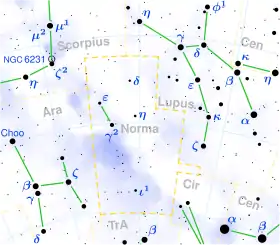Gamma1 Normae
Gamma1 Normae, Latinized from γ1 Normae, is a single,[9] yellow-white hued star in the southern constellation of Norma. It is faintly visible to the naked eye with an apparent visual magnitude of 4.98.[2] The annual parallax shift is only 2.22±0.27 mas as measured from Earth,[1] which yields a rough distance estimate of 1,500 light years from the Sun. It is moving closer to the Sun with a radial velocity of around -16 km/s.[4]
 | |
| Observation data Epoch J2000.0 Equinox J2000.0 (ICRS) | |
|---|---|
| Constellation | Norma |
| Right ascension | 16h 17m 00.93411s[1] |
| Declination | −50° 04′ 05.2333″[1] |
| Apparent magnitude (V) | 4.98[2] |
| Characteristics | |
| Evolutionary stage | Supergiant |
| Spectral type | F9 Ia[3] |
| U−B color index | +0.49[2] |
| B−V color index | +0.80[2] |
| Astrometry | |
| Radial velocity (Rv) | −16.0±5.1[4] km/s |
| Proper motion (μ) | RA: −1.69[1] mas/yr Dec.: −3.39[1] mas/yr |
| Parallax (π) | 2.22 ± 0.27[1] mas |
| Distance | approx. 1,500 ly (approx. 450 pc) |
| Absolute magnitude (MV) | -3.62[3] |
| Details | |
| Mass | 6.6±0.4[5] M☉ |
| Radius | 160[6] R☉ |
| Luminosity | 2039.91[7] L☉ |
| Surface gravity (log g) | 2.0[8] cgs |
| Temperature | 6,068[8] K |
| Metallicity [Fe/H] | −0.13[8] dex |
| Age | 53.4±7.4[5] Myr |
| Other designations | |
| Database references | |
| SIMBAD | data |
This is an F-type supergiant star with a stellar classification of F9 Ia[3] It has 6.6[5] times the mass of the Sun and has expanded to about 160[6] times the Sun's radius. The star is radiating 2,040[7] times the Sun's luminosity from its enlarged photosphere at an effective temperature of 6,068 K.[8] It is estimated to be around 53 million years old.[5]
γ2 Nor is a nearby star nearly a magnitude brighter.
References
- Van Leeuwen, F. (2007). "Validation of the new Hipparcos reduction". Astronomy and Astrophysics. 474 (2): 653. arXiv:0708.1752. Bibcode:2007A&A...474..653V. doi:10.1051/0004-6361:20078357.
- Ducati, J. R. (2002). "VizieR Online Data Catalog: Catalogue of Stellar Photometry in Johnson's 11-color system". CDS/ADC Collection of Electronic Catalogues. 2237. Bibcode:2002yCat.2237....0D.
- Kovtyukh, V. V.; Chekhonadskikh, F. A.; Luck, R. E.; Soubiran, C.; Yasinskaya, M. P.; Belik, S. I. (2010). "Accurate luminosities for F-G supergiants from FeII/FeI line depth ratios". Monthly Notices of the Royal Astronomical Society. 408 (3): 1568. Bibcode:2010MNRAS.408.1568K. doi:10.1111/j.1365-2966.2010.17217.x.
- de Bruijne, J. H. J.; Eilers, A.-C. (October 2012), "Radial velocities for the HIPPARCOS-Gaia Hundred-Thousand-Proper-Motion project", Astronomy & Astrophysics, 546: 14, arXiv:1208.3048, Bibcode:2012A&A...546A..61D, doi:10.1051/0004-6361/201219219, A61.
- Tetzlaff, N.; Neuhäuser, R.; Hohle, M. M. (2011). "A catalogue of young runaway Hipparcos stars within 3 kpc from the Sun". Monthly Notices of the Royal Astronomical Society. 410: 190–200. arXiv:1007.4883. Bibcode:2011MNRAS.410..190T. doi:10.1111/j.1365-2966.2010.17434.x.
- Pasinetti Fracassini, L. E.; et al. (2001). "Catalogue of Apparent Diameters and Absolute Radii of Stars (CADARS)". Astronomy and Astrophysics (Third ed.). 367 (2): 521. arXiv:astro-ph/0012289. Bibcode:2001A&A...367..521P. doi:10.1051/0004-6361:20000451.
- Anderson, E.; Francis, Ch. (2012). "XHIP: An extended hipparcos compilation". Astronomy Letters. 38 (5): 331. arXiv:1108.4971. Bibcode:2012AstL...38..331A. doi:10.1134/S1063773712050015. Vizier catalog entry
- Kovtyukh, V. V.; Gorlova, N. I.; Belik, S. I. (2012). "Accurate luminosities from the oxygen λ7771-4 Å triplet and the fundamental parameters of F-G supergiants". Monthly Notices of the Royal Astronomical Society. 423 (4): 3268–73. arXiv:1204.4115. Bibcode:2012MNRAS.423.3268K. doi:10.1111/j.1365-2966.2012.21117.x.
- Eggleton, P. P.; Tokovinin, A. A. (September 2008). "A catalogue of multiplicity among bright stellar systems". Monthly Notices of the Royal Astronomical Society. 389 (2): 869–879. arXiv:0806.2878. Bibcode:2008MNRAS.389..869E. doi:10.1111/j.1365-2966.2008.13596.x.